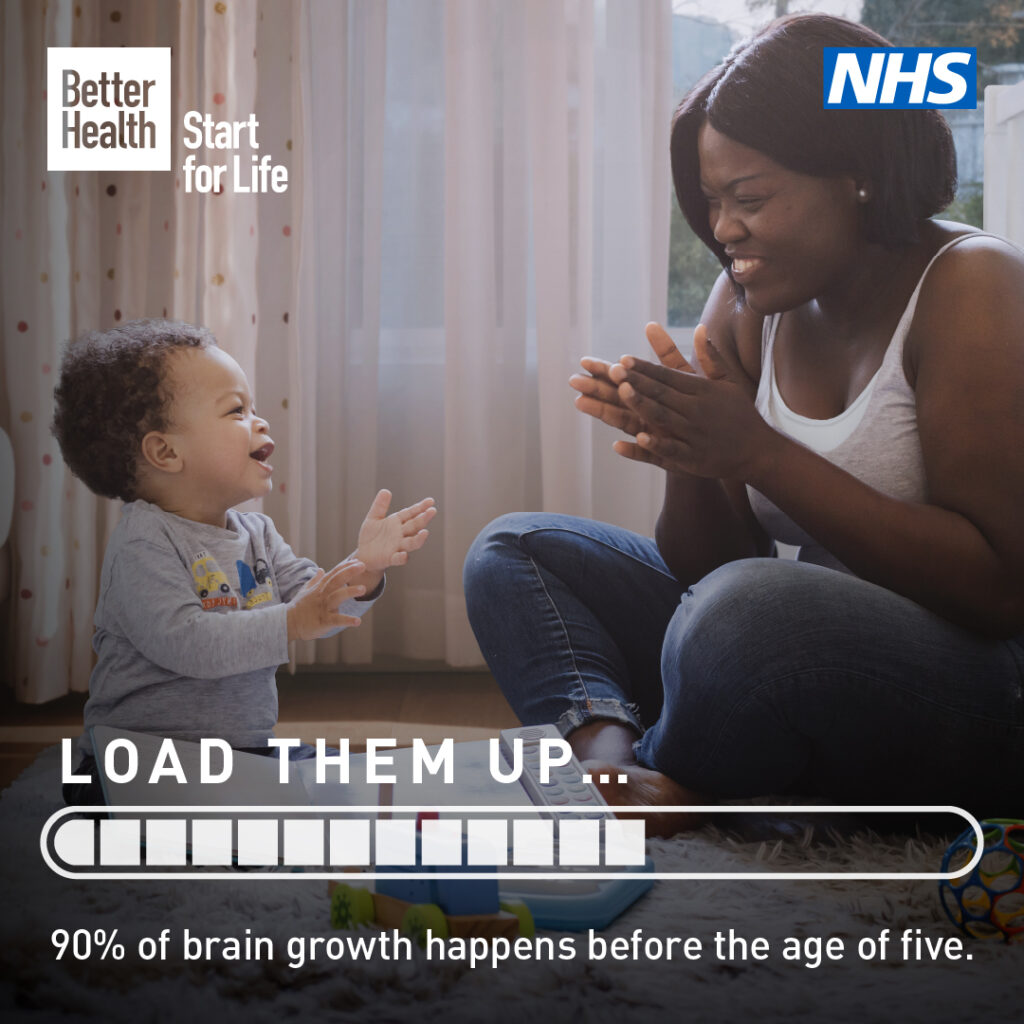Better Start to Life – Home Learning Environment

The Department for Education (DfE), in partnership with the Department for Health and Social Care (DHSC) has launched its Start for Life ‘Little Moments Together’ campaign. The campaign aims to improve children’s language and communication skills and ultimately increase levels of school readiness in reception aged children by educating parents about the importance of brain development in the first five years of a child’s life, and the crucial role they play, with advice and tips from Start for Life.
We know that what happens during the first few years of life (starting in the womb) has lifelong effects on many aspects of health and wellbeing – from obesity, heart disease and mental wellbeing, to educational achievement and economic status. We also know that parental behaviours impact heavily on their child’s behaviours. Parents’ health can act as an enabler or barrier to nurturing their children’s development.
Too many children in the UK start school developmentally months behind their peers, particularly in speech and language ability. This gap often widens over time, particularly in disadvantaged groups, with children who have poor vocabulary skills at age five being less likely to succeed academically. They are also up to twice as likely to be unemployed in their thirties.
Early childhood is a crucial time for brain development, when a young, developing brain changes shape and size in response to everything it encounters. This early-stage development is relatively unknown among parents, which presents an opportunity for us to break down the science in an easily accessible way for parents.
There are many ways to boost your child’s brain development. Like helping them to ask questions, so they can grow their understanding of the world. The more we chat, play and read with our kids, the more we help build their brains. Anytime, anywhere, whether at home or out and about, it all adds up. There’s no need to buy lots of toys or have big days out. Wherever you are, simply chatting back and forth, answering your child’s questions and sharing special moments together all help their brain to grow and develop secure and strong connections. Just what they need to get off to the right start at school.
The Start for Life website is packed with simple ideas from other parents on how to build these little moments into each day. It includes lots of examples of tips and activities for you to do together with your child at different ages, as well as links to find further support in your local area.
Visit the Start for Life website for more tips and advice.
As part of the campaign’s resources, a new film has also been released to explain how children’s brains develop during the early years, and the crucial role parents play through all the little moments they spend together with their child. Watch it here.
Start for Life Email Programme
Along with its other resources Better Health offers a Start for Life Email Programme. This programme is a universal offering, for all parents-to-be and parents of children up to four and a half years old. The service provides regular emails to the audience as their child reaches key milestones.
The email programme can be translated into dozens of different languages, provides personalised messaging that is time sensitive and served to parents and carers as and when they need it, according to their parenting/caring journey.
If you would like to find out more or sign up to this service, please click on the link below.

Additional resources
For more information and resources on helping your child to develop please check out the links below.
- BBC – Tiny Happy People is a BBC service for the parents and carers of the youngest learners. The one minute, one message films offer tips and activities for language learning through play, plus films that show babies’ brains development and why parents are so important to that development.
- Book Trust – Reading tips, activities, story-time videos, book recommendations and more.
- National Literacy Trust – Milestones, tips, resources and advice for parents to support their child’s literacy development.
- Institute of Wellbeing – Advice to support literacy development and wellbeing kits to help parents take care of their family and their mind.
- Speech and Language UK – Support for parents who are worried about their child’s language development.
- Early Years Alliance – Practical tips for parents to support their child to learn through play.
What you do together can make a huge difference. Every smile, every cuddle and every chat help to build your baby’s brain.
